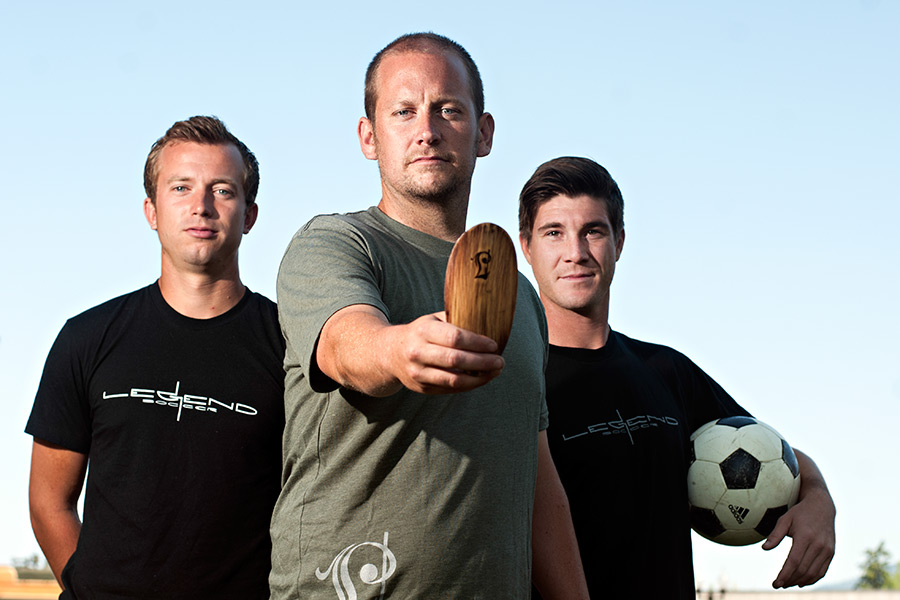WHITEFISH – The beauty of soccer lies in its simplicity: one ball, two goals and any number of players. This is a huge part of the sport’s appeal, and one of the reasons that people from the slums of Buenos Aires to the Flathead Valley can grow up playing “jogo bonito” – the beautiful game.
Roland Benedict, Chris Fannon, and Sean Person of the Flathead Valley are trying to bring that simplicity back to the game through their new brand, Legend Soccer Company, which will launch a Kickstarter funding campaign on July 18. All three founders are avid soccer players and the informal motto of the company seems to be, “we’re a soccer company, for soccer players, made by soccer players.”
The three of them, all dressed in gothic-looking Legend Soccer T-shirts, became friends through soccer, and between them, have played at every level, from high school through college and all the way to the Belgian league and trials at renowned British team Manchester City. Today, they are teammates on the Flathead Rapids soccer team, of which Person is the director.
“The idea of Legend was rooted in history,” Person said. “The game goes back thousands of years,” and is played by people all over the world, and yet today the soccer industry is dominated by around 10 brands. Nike and Adidas bring out gaudy and futuristic-looking cleats and accessories every year, and Person said “it is the opposite of what soccer means to me and the millions of people who play it all around the world.”
According to Fannon, a defender whom his co-founders compare to Brazilian star David Luiz, those companies “are just using graphic designers” to come up with their products, whereas Legend is run by people with decades of playing experience. Unlike most major sports brands, Legend only makes equipment for one sport, soccer.
Their first product, which Benedict hopes embodies the core values of the company, is a bamboo shin guard. The idea of introducing something as old-fashioned as wood is novel in an industry where everything is made of a combination of plastic and carbon fibers, but according to Benedict, it makes perfect sense. Bamboo is incredibly light, has a stronger tensile strength than steel, and leaves less of an environmental footprint than plastic or carbon fiber. Above all, bamboo shin guards are simple: a piece of curved wood to protect your shins from reckless challenges.
The shin guard is sleek and tan, produced with bamboo from Florida. Made by hand, Person said, “the greatest challenge was finding the curve that was hard enough,” and yet still fit the contours of the human calf. In order to comply with regulations, they had to complete a variety of tests on the shin guard, including whacking it with an anvil.
“No professional wants to wear shin guards, so our goal is to make them as inconspicuous and comfortable as possible,” Fannon said. The founders all wear their own shin guards when playing and are considering making different size guards for different positions, since a striker is more focused on close control and a defender is looking for good protection.
Another product they are working on is a completely adjustable, lace-less cleat. Again, the goal is simplicity.
“We want to recreate a sock feel, so that you don’t feel like there’s a shoe on your feet,” Person said.
Although they want to be based in the Flathead Valley, their goals for the company extend well beyond. Person said the company is “a platform to do something special in the game,” and Fannon added that ultimately, “we want to create a way for people to experience soccer as we got to experience it.” This means not only creating great products, but also helping people get access to equipment through donations. As he explained, “People could donate stuff to us and we would spiff it up and then distribute it.”
“Soccer is one of the big, upcoming markets in America,” Person said, and he and his co-founders hope to provide products rooted in the spirit of the game.
Legend Soccer Company will be launching its kickstarter campaign with a party at Cooper’s Eatery in Whitefish at 7 p.m. on July 17. The goal is to get enough funding so that the founders can ramp up the production of their shin guards to make them cheaper – they would currently cost around $40 a pair – and accessible to soccer payers in the valley and across the world.
